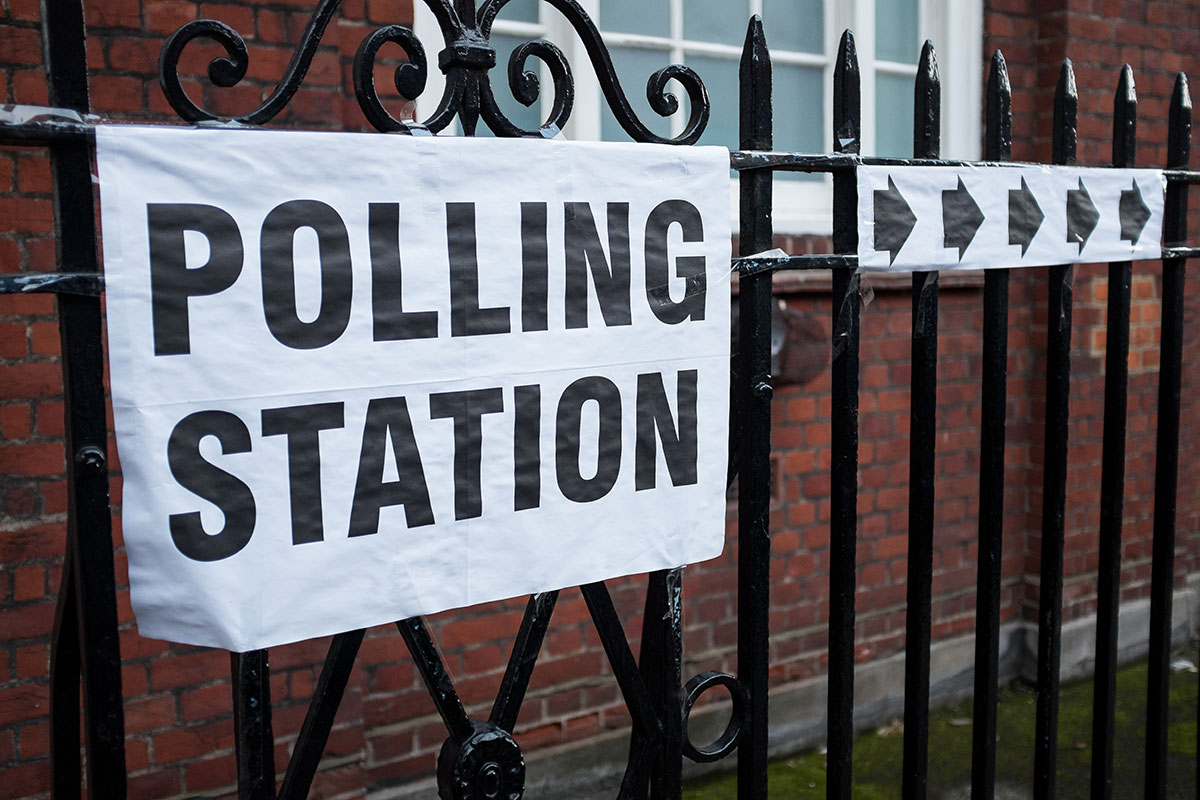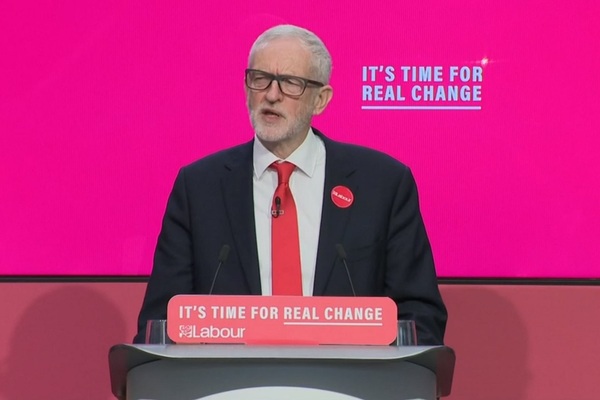Inside Housing’s general election round-up blog: week two
Get all of the latest housing general election news through Inside Housing’s weekly blog
With election day now under three weeks away, Inside Housing has decided to publish a weekly diary on all of the major housing announcements in the weeks leading up to 12 December.
With a reporter covering every major party we hope to bring you all the key policy promises from all sides of the political landscape.
Scroll down to find out what the parties are saying about housing on the campaign trail.
The Conservative Party
With news and analysis of Prince Andrew’s car crash interview on Saturday dominating the headlines, the general election played second fiddle for once in last Sunday’s paper.
Yet on Monday normal service was resumed as Boris Johnson gave a keynote speech at the Confederation of British Industry’s annual conference. While the reaction to his speech was dominated by his announcement that he would not cut corporation tax next March, he did have a line or two for the housing sector.
Fielding a question from a member of the audience, he was forced to defend the Conservative Party’s record in delivering affordable homes. Mr Johnson said that obstructions in planning are partly why development is being held up. However, he also used his response to take aim at the housebuilding sector and the “ogliopoly” currently being run, which prevents smaller developers from building.
For those readers who, like me, have no idea what ogliopoly actually means, the Oxford definition is a state of limited competition, where a market is shared by a small number of sellers. For the current housebuilding sector, you could argue that Mr Johnson’s summation is quite accurate.
Tuesday saw Mr Johnson battle it out with Labour leader Jeremy Corbyn in the first leadership debate. Mentions of any housing policy were conspicuous in their absence, with Mr Johnson instead using his time in the debate to focus on Brexit, policing numbers and the 40 hospitals his government would build. Or was it seven?
However, it could be argued that both politicians were saving it up for the housing splurge that came on Wednesday. Not wanting to be outdone by Labour’s £75bn housing giveaway, the Conservatives responded with a flurry of their own housing announcements., helpfully rounded up by housing secretary Robert Jenrick below.
📢 HOUSING NEWS ANNOUNCED TODAY
— Robert Jenrick (@RobertJenr
|/>
A @Conservatives govt will:
🏠 Deliver at least 1m homes by 2025
🏠 Help people buy with long-term fixed rate mortgages requiring only 5% deposits
🏠 Provide a 30% discount for local first-time buyers
🏠 End no fault evictions9\uD83D\uDCE2 HOUSING NEWS ANNOUNCED TODAY \uD83D\uDCE3
— Robert Jenrick (@RobertJenrick) November 21, 2019
A @Conservatives govt will:
\uD83C\uDFE0 Deliver at least 1m homes by 2025
\uD83C\uDFE0 Help people buy with long-term fixed rate mortgages requiring only 5% deposits
\uD83C\uDFE0 Provide a 30% discount for local first-time buyers
\uD83C\uDFE0 End no fault evictions
Arguably, the most eye-catching for the papers was the idea to bring in 95% mortgages with fixed rates that could last over a number of decades.
The move comes hot on the heels of the shared ownership Right to Buy announcement and is a clear indication that a Conservative government with Mr Johnson at the helm will have a major focus on homeownership.
The Labour Party
It was manifesto week for the Labour Party, which unveiled a raft of housing policies.
Ahead of the big launch on Thursday morning, the party trailed an eye-catching pledge in the press: £75bn for housing over five years to deliver at least 150,000 social homes a year by the end of the next parliament, including 100,000 council homes.
It is understood that the £75bn would include council borrowing for housing, so direct comparisons are not available, but the Conservative government’s current affordable homes grant programme is worth £9bn over five years.
As for the council housebuilding pledge, last year town halls managed fewer than 3,000 new homes. The manifesto itself revealed that a Labour government would tie these ambitions to a new duty on local authorities to deliver council housing, as well as “reviewing the case for reducing the amount of housing debt councils currently hold” and giving town halls “powers and funding to buy back homes from private landlords”.
Some recently announced policies – such as a commitment to scrap Universal Credit and ban leasehold ownership – were reaffirmed, as were longer-standing pledges such as ending the Right to Buy.
Other notable new policies include an extra £1bn for council homelessness services and a “use it or lose it” land tax for developers of stalled housing schemes.
The headline announcements were welcomed by housing bodies Shelter, the Chartered Institute of Housing and the National Housing Federation – with the latter branding them “a real game-changer for social housing”.
But influential thinktank the Institute for Fiscal Studies has been less positive about Labour’s manifesto. It told ITV News that the party’s overall spending promises are “colossal” and that the plan to raise £80bn from companies and high-earners is “simply not credible”.
Meanwhile, shadow housing secretary John Healey branded the Conservatives’ housing announcements on Thursday “a total Tory fiasco”, focusing on the apparent cutting of their annual housebuilding target.
In response to Labour’s big housing plans, the Tories have CUT their house building target by 100,000 homes a year. What a total Tory fiasco. The Conservatives are clueless on housing, they have no plan to fix the housing crisis.#LabourManifesto19 #VoteLabourDecember12 t.co/bXIb09XjC2
— John Healey (@JohnHealey_MP)In response to Labour’s big housing plans, the Tories have CUT their house building target by 100,000 homes a year. What a total Tory fiasco. The Conservatives are clueless on housing, they have no plan to fix the housing crisis.#LabourManifesto19 #VoteLabourDecember12 https://t.co/bXIb09XjC2
— John Healey (@JohnHealey_MP) November 21, 2019
Earlier in the week, shadow housing minister Sarah Jones wrote to Mr Jenrick about the Bolton fire at the weekend. She said the situation on dangerous cladding is a “national crisis” and accused the government of “sitting on its hands” over the issue, demanding an urgent and wide-ranging response from ministers.
The Liberal Democrats
Picture: Chris McAndrew
If you were reading about the Liberal Democrats at any point this week, you probably did not have to read too far ahead to see the word “squeeze”.
It has been a frustrating week for Jo Swinson (above) and her party as polling in recent days has seen its support plateau, according to the polls.
There was controversy on Sunday as Ms Swinson was drawn into a fake news row after defending a Lib Dem leaflet that quoted The Guardian as saying her party was winning and on the up.
She was hit by more bad news on Monday when it emerged that she and the Scottish National Party had lost their High Court battle to challenge the lawfulness of the decision not to include her on Tuesday night’s leadership debate.
However, Wednesday was manifesto day for the Lib Dems and there was a lot to get excited about for the housing sector.
The party promised to build 100,000 homes over the next five years, all for social rent.
The @LibDems commitment to get building in their #GE2019 manifesto is vital and lays the gauntlet down for all parties.
— Shelter (@Shelter
Their pledge to #BuildSocialHousing at scale would, if implemented, do more than any other single measure to end the #HousingEmergency🏠🚨a>The @LibDems commitment to get building in their #GE2019 manifesto is vital and lays the gauntlet down for all parties.
— Shelter (@Shelter) November 20, 2019
Their pledge to #BuildSocialHousing at scale would, if implemented, do more than any other single measure to end the #HousingEmergency\uD83C\uDFE0\uD83D\uDEA8
The party has also followed recent moves by the Conservatives and Labour in recent times by trying to come up with a new tenure that will get people onto the housing ladder, with its Rent to Own pla p;
The plan would see social housing tenants gain an increasing stake in their property through renting, which would allow them to own it outright after 30 years.
Alongside the housing announcement was a pledge to create a £130bn capital infrastructure budget that would see investments in schools, broadband, transport and hospitals.
The Scottish National Party
Like the Liberal Democrats, the Scottish National Party (SNP) started the week losing a separate High Court legal challenge over the decision not to include Nicola Sturgeon (above) in Wednesday night’s ITV debate.
Instead of heading to Salford, therefore, Ms Sturgeon went to Dundee, where she made a keynote speech in which she highlighted the similarities in policy between the SNP and Labour, accusing Mr Corbyn’s party of “borrowing” ideas and copying some of the policies SNP had already enacted in government.
While Ms Sturgeon’s speech did not mark the beginning of a friendly alliance between the two parties, she also said that a vote for the SNP in Scotland would help to secure a “progressive majority” at Westminster. The subtext of this is that a post-election pact with Labour is still on the horizon.
"Labour has clearly been looking to Scotland for inspiration."
— Sky News (@SkyNews)
SNP leader @NicolaSturgeon says it is "striking" how much Labour's #GeneralElection2019 policy "borrows from what the SNP has already done in government".
Read more on the #GE2019 here 👉 t.co/amVHXSjDKe pic.twitter.com/p6XMxMU6C6>"Labour has clearly been looking to Scotland for inspiration."
— Sky News (@SkyNews) November 20, 2019
SNP leader @NicolaSturgeon says it is "striking" how much Labour's #GeneralElection2019 policy "borrows from what the SNP has already done in government".
Read more on the #GE2019 here \uD83D\uDC49 https://t.co/amVHXSjDKe pic.twitter.com/p6XMxMU6C6
Again, it was a quiet week in terms of housing for the SNP – unsurprising considering housing is devolved to the Scottish government. Tonight, Ms Sturgeon will take part in a special episode of question time, alongside Ms Swinson, Mr Johnson and Mr Corbyn.
More on the general election 2019
End Our Cladding Scandal general election campaign: full coverage
The cladding scandal is far from over. Here’s why we need a fresh approach
Click here to read the full story
Ahead of the general election, Inside Housing revisits our national cladding scandal and sets out what needs to be done to prevent any further tragedies. Peter Apps reports.
The cladding crisis Down Under: what we can learn from the response to Grenfell in Australia
Click here to read the full story
Five years ago a fire spread up Grenfell-style ACM cladding on a high-rise in Melbourne. This prompted an overhaul of the Australian state of Victoria’s building safety regime. Peter Apps finds out what the UK could learn.
More than 100,000 buildings outside scope of fire safety measures, minutes reveal
Click here to read the full story
There are more than 100,000 medium-rise homes that fall outside new regulations aimed at making buildings safe in the aftermath of Grenfell, including the ban on combustible cladding, Inside Housing can reveal.
It’s only a matter of time until the next Bolton unless the parties step up to the plate on fire safety
Click here to read the full story
Inside Housing’s new election campaign calls on the main political parties to commit to taking action to prevent what currently seems like an inevitable further tragedy. It’s time for everyone to step up, writes Martin Hilditch.
Leaseholders fear missing out on £200m cladding fund as bidding deadline approaches
Click here to read the full story
Leaseholders living in blocks seeking government funding for the removal of Grenfell-style cladding have raised concerns over meeting the deadline for applications, while criticising the lengthy process being run by the government.
Government refusing to test polystyrene panels, despite request from London boroughs
Click here to read the full story
The government has no further plans to carry out testing of cladding products despite a specific request from London boroughs to test systems comprising polystyrene, a document obtained by Inside Housing has revealed.
End Our Cladding Scandal: campaign asks
The next government must:
- Create a ‘building safety fund’ to help pay for the necessary remediation work to affected buildings in the social and private sector – not just those with ACM cladding and above 18m
- Set up a taskforce, with the involvement of residents, capable of inspecting buildings, prioritising and ordering work and ensuring leaseholders are protected from unnecessary costs

















